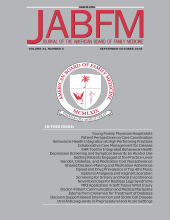Abstract
Background: Guidelines, policies, and warnings have been applied to reduce the use of medications for behavioral and psychological symptoms of dementia (BPSD). Because of rare dangerous side effects, antipsychotics have been singled out in these efforts. However, antipsychotics are still prescribed “off label” to hundreds of thousands of seniors residing in nursing homes and communities. Our objective was to evaluate how and why primary-care physicians (PCPs) employ nonpharmacologic strategies and drugs for BPSD.
Methods: Semi-structured interviews analyzed via template, immersion and crystallization, and thematic development of 26 PCPs (16 family practice, 10 general internal medicine) in full time primary-care practice for at least 3 years in Northwestern Virginia.
Results: PCPs described 4 major themes regarding BPSD management: (1) nonpharmacologic methods have substantial barriers; (2) medication use is not constrained by those barriers and is perceived as easy, efficacious, reasonably safe, and appropriate; (3) pharmacologic policies decrease the use of targeted medications, including antipsychotics, but also have unintended consequences such as increased use of alternative risky medications; and (4) PCPs need practical evidence-based guidelines for all aspects of BPSD management.
Conclusions: PCPs continue to prescribe medications because they meet patient-oriented goals and because PCPs perceive drugs, including antipsychotics and their alternatives, to be more effective and less dangerous than evidence suggests. To optimally treat BPSD, PCPs need supportive verified prescribing guidelines and access to nonpharmacologic modalities that are as affordable, available, and efficacious as drugs; these require and deserve significant additional research and payer support. Community PCPs should be included in BPSD policy and guideline development.







